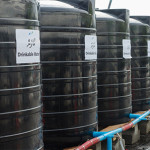State media are broadcasting images of six men wanted in connection to gang fighting which has plagued the capital for over a week. But while police have been unable to track down their suspects in an island less than 2.5 square kilometres in size, Minivan News journalist Susannah Peter, who arrived in the Maldives less than three months ago, was able to meet two of the wanted men for coffee last night.
Here, the two fugitives and other members of the Kuda Henveiru “family†tell her why the police can’t infiltrate their world. They describe police aggression towards gang members, and explain the family will protect them because none believe the authorities will investigate the fighting fairly.
Scapegoats?
Ahmed Alif Rauf, 21, and Ahhmed Simhan, 21, greet me cheerfully as I am ushered inside a brightly lit, cosy front room. One of their friends offers me a cup of coffee, while another “family” (they prefer not to use the word “gang”) member draws up a seat.
Yet both men, members of the Kuda Henveiru group, one of two main gangs in Male’, are hiding from police who want them in connection with the street violence that allegedly led to the death of their fellow “brother” Chotey last Sunday night.
Alif tells me they fear they “will be made scapegoats” if they turn themselves in before Hussain Razeen (Raburry) leader of rival gang Bosnia and also wanted by police, is arrested first.
“The Government support Raburry and Bosnia,” he claims. “So the police don’t want to arrest him, even though they have heard he is back in Male’.
“If we are arrested first, the police will blame it all on us, even the death of Chotey [Ali Ishar, a fellow member of the Kuda Henveiru family who died after a knife attack last Sunday]†Alif says.
“Why would they do anything to harm a brother, one of their closest friends?” another gang member interjects, shaking his head sadly. “They wouldn’t do that, it makes no sense.”
At this point, another young man enters the room and perches on the sofa, looking slightly nervous and edgy. He is introduced as an eyewitness to Chotey’s attack, and asks not to be named.
He says he saw two rival gang members near Chotey’s house, and rushed back to warn his “brother.” But it was too late. Chotey had gone to a nearby shop, and was attacked when he left.
The eyewitness has named three men he says were among those who stabbed Chotey, although Minivan News has withheld the names.
Police have been trying to get in touch with the eyewitness, he tells me. “But I’m afraid they will arrest me,” he says, twitching slightly. “Because I know Raburry did this, and they don’t want to have to arrest him.”
He adds he has received “death threats” from Bosnia members since the attack on Chotey. “I am scared for my life,” he says quietly. “And I’ll never forget what I saw that night. I have nightmares about it.”
Police Aggression?
News of Chotey’s death sparked unrest throughout the capital, amid accusations of police heavy handedness.
“They only get there once the trouble is over, and then cause unrest,” says Alif, grimly.
And he claims police intimidate Kuda Henveiru members even as they gathered to pay their last respects to Chotey late last Sunday night.
As, “brothers” gathered along with “mothers, sisters and children,†at Malé’s Artificial Beach, a Kuda Henveiru haunt, police and Star force officers arrived.
“We were preparing go to the cemetery, where Chotey’s body had been taken, when one of the STAR Force officers pushed a brother,†one member claims.
“And they started hitting women and children, arresting some and not others,” he says. “It was one of the scariest times I have had, because I was worried women would get hurt.”
Trust
Gang members have named ten of the “family members” they arrested, although the sister of a member, who does not want to be named, tells me “they arrested many more, but will not tell us who they are.”
And police, who arrested her brother, “beat him repeatedly” with truncheons, while they waited to take him to the station. Her brother, who she says is still in custody, suffered leg and head injuries, and is now in Malé receiveing medical treatment.
Police Media Coordinator Sergeant Shiyam told Minivan News last week he “could not comment” on allegations of police violence. And of course many people will doubt claims made by anonymous gang members.
But what is clear is that distrust of the authorities among Malé’s powerful street gangs is obstructing the investigation into Ali Ishar’s death and the violence surrounding it. And if the distrust is not breached, more violence will result.
“We don’t believe Ishar’s family will get justice from Government or Police,” says one brother. “We’ll have to fight ourselves to get justice for him. There won’t be deaths, but there will be violence.”
 (0)Dislikes
(0)Dislikes (0)
(0)




7d16U6 Very true! Makes a change to see someone spell it out like that. 🙂